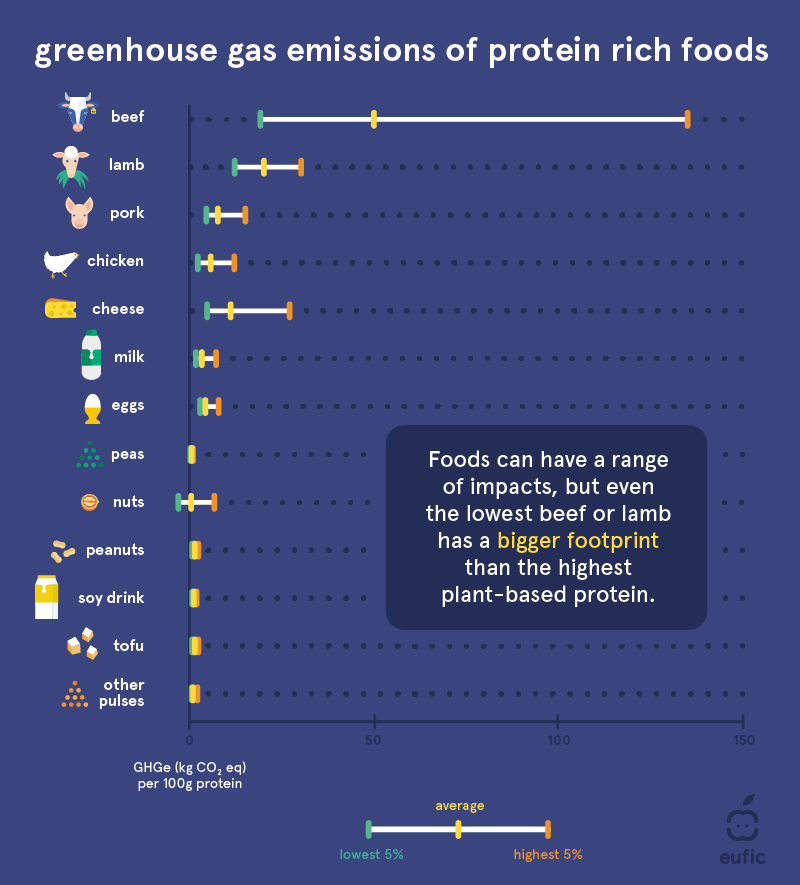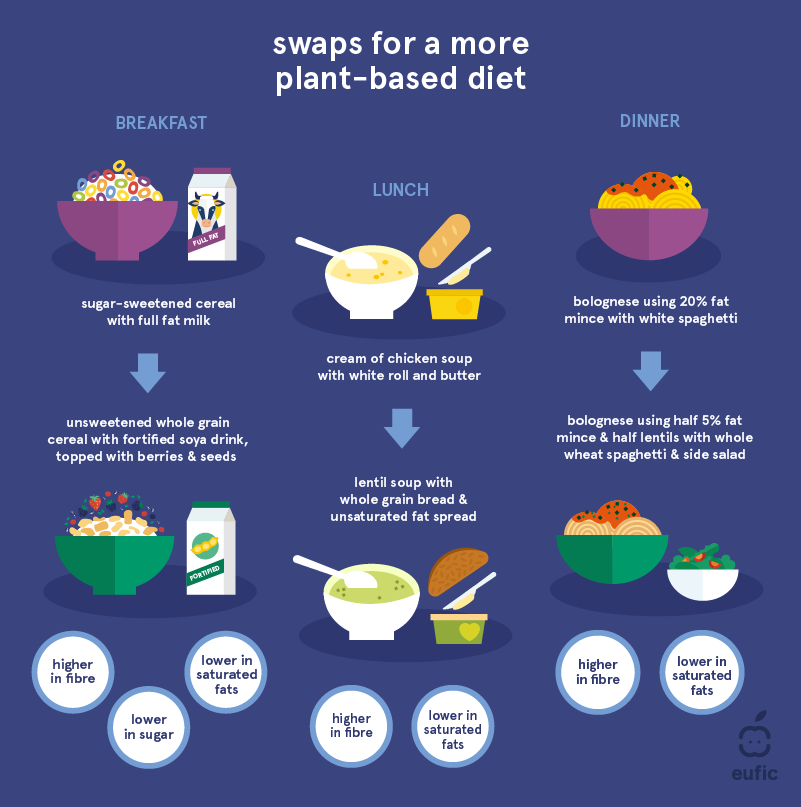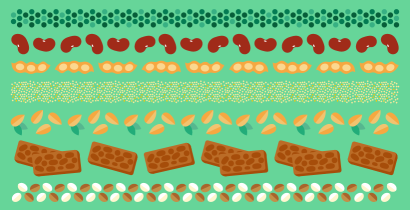What is a plant-based diet and does it have any benefits?
Last Updated : 07 January 2021The phrase ‘plant-based diet’ seems to crop up everywhere these days, but what does it really mean? Well, it depends on whom you ask. Here we discuss what defines a plant-based diet, the potential benefits of eating a plant-based diet, and provide some helpful tips for those looking to shift to a more plant-based way of eating.
What is a plant-based diet?
To date, there is no consensus on what defines a plant-based diet. It has been used to describe a variety of dietary patterns, ranging from a Vegan diet to a Mediterranean diet. While these ways of eating differ in the amount of meat and dairy they contain, all descriptions of a plant-based diet largely focus on the promotion of healthy plant foods such as fruits, vegetables, whole grains, beans, pulses, nuts and seeds.
Although a plant-based diet is often used to describe a plant-only or vegan diet, it is not about the complete avoidance of animal products. Plant-based diets should be thought of as plant-forward diets or 'flexitarian' approaches, which emphasise eating healthy plant foods. While meat and dairy products are not necessarily avoided altogether, the frequency and portions that they are consumed will be reduced and most of the nutrients should come from healthy plant foods.
What are the benefits of a healthy plant-based diet?
Plant-based diets have been praised for their benefit to our health and the environment.
Health benefits of a plant-based diet
Plant-based diets are rich in fruits, vegetables, whole grains, beans and pulses which are well known for their health benefits.1 Therefore, it may come as no surprise that people who eat a plant-based diet rich in these healthy foods have a reduced risk of several diseases, including heart disease, certain cancers and type 2 diabetes.2,3,4
Like most healthy diets, the exact reason plant-based diets protect us against diseases is not fully understood. Their benefit is likely due to a combination of many factors, including a lower energy density, higher intakes of vitamins, minerals, unsaturated fats and fibre, as well as a reduction in saturated fat, sugars, salt and red and processed meats. In addition, people who follow plant-based diets tend to be more health conscious and live healthier lifestyles (i.e. are less likely to smoke, more physically active and moderate alcohol drinkers) than the people they are compared to. Therefore, some of the observed benefits for plant-based diets may be attributable to other health behaviours.5
Environmental benefits of a plant-based diet
Our everyday food choices not only affect our health but also the environment. Currently, the global food system contributes to approximately 20-35% of the worlds greenhouse gas emissions and is a major driver of land conversion, deforestation and loss of biodiversity.6 In general, animal products such as beef, lamb and dairy have a higher environmental impact (i.e. use more resources and produce more greenhouse gases) than plant-based sources such as soy, nuts and pulses.6
Shifting dietary patterns to include more healthy plant foods can benefit our health and the planet.7 However, it is important to remember that sustainable eating is more than just reducing animal products, it is also about reducing food waste, eating more local and seasonal food and choosing more sustainable packaging.
In summary
A healthy plant-based diet can benefit both our health and the planet. Transitioning to a more plant-based diet should focus on increasing healthy plant foods and worry less about reducing animal products.

Figure 1. Green house gas emissions (GHGe) of protein rich foods.6 Lowest 5% describes that 5% of production systems for that particular food emit that amount or less. Highest 5% means the top 5% of production systems for that particular food emit that amount or more.
Can a plant-based diet be unhealthy?
In short, Yes! Not all plant foods are created equal and just reducing animal products will not automatically lead to good health. Like all diets, both the quantity and quality of the diet are the deciding factors in determining their health benefit. A plant-based diet rich in plant foods high in fat, sugar and salt, will increase our risk of disease just like any other unhealthy diet.8
Plant-based meat alternatives have become extremely popular for those looking to reduce their consumption of animal products. While there is some evidence that these products have a lower environmental impact compared to meat, particularly beef, many products contain high amounts of salt, which can have a negative effect on our health.9 If you buy plant-based meat alternative make sure to check the label and choose low salt varieties.
People choosing to eliminate entire food groups are at increased risk of nutrient deficiencies. This includes plant-based diets that avoid all animal products – like vegan diets – if they are not adequately balanced with alternatives for those animal products. Although vegan diets can be perfectly healthy, particular care is needed to meet requirements for certain nutrients such as vitamin B12 as fortified foods and supplements are the only suitable sources.10
Can you lose weight on a plant-based diet?
Contrary to popular belief, there is no ‘best’ diet for weight loss. All diets, whether low-fat, low-carb or even plant-based can be effective at reducing body weight as long you burn more calories than you consume. To date, there is no convincing evidence to suggest that a plant-based diet is any more effective at reducing body weight than any other dietary pattern.11,12
Most diets will lead to weight loss in the short term but keeping that weight off can be difficult to maintain. Therefore, the ‘best’ diet for weight loss is the one that can be enjoyed and stuck to long-term.
How do you get protein on a plant-based diet?
Protein is essential for the growth and repair of our cells and tissues. When it comes to a plant-based diet, most of the protein in the diet should come from plant foods such as beans, pulses and whole grains.
There is a common misconception that plant-based diets, particularly those with no animal products, lead to protein deficiencies. This is not true, as long as protein is consumed from a variety of plant sources, most adults can easily meet the dietary reference value (DRV) for protein of 0.83g per kg bodyweight per day (i.e. 58g/day for a 70 kg adult).10 In fact, some evidences suggest that higher intakes of plant-based protein can have a protective effect on our long-term health.13
How to eat a healthy plant-based diet?
Just because a food is made from a plant does not automatically make it healthy. Eating a healthy plant-based diet is about eating more healthy plant foods and limiting unhealthy plant foods. To help those looking to eat a plant-based diet here are some helpful tips:
- Swap or reduce portions of meat by choosing plant-based proteins like beans, pulses and tofu
- Eat more fruits and vegetables, aim for at least 1-2 servings at every meal
- Limit foods and drinks high in fat, sugar and salt, such as crisps, sodas, chocolate, sweets, cakes and other desserts
- Choose whole grains over refined grains
- Choose unsalted nuts and seeds
- Use plant oils rich in unsaturated fat such as olive oil or rapeseed oil
- If replacing or reducing dairy products, use fortified alternatives like fortified soy drinks
- If replacing or reducing meat with plant-based meat alternatives, always check the nutrition label and choose varieties low in salt.
Like all diets, the key to adopting a healthy plant-based diet is about finding foods and meals you enjoy and can stick to long-term.

Figure 2. Simple food swaps to eat a healthy plant-based diet.
References
- Bechthold, A., Boeing, H., et al. 2019. Food groups and risk of coronary heart disease, stroke and heart failure: a systematic review and dose-response meta-analysis of prospective studies. Critical reviews in food science and nutrition, 59(7), pp.1071-
- Satija, A. and Hu, F.B., 2018. Plant-based diets and cardiovascular health. Trends in cardiovascular medicine, 28(7), pp.437-441.
- Qian, F., Liu, G., Hu, F.B., Bhupathiraju, S.N. and Sun, Q., 2019. Association between plant-based dietary patterns and risk of type 2 diabetes: a systematic review and meta-analysis. JAMA internal medicine, 179(10), pp.1335-1344.
- World Cancer Research Fund/American Institute for Cancer Research. Diet, Nutrition, Physical Activity and Cancer: a Global Perspective. Continuous Update Project Expert Report 2018.
- Mihrshahi, S., et al. 2017. Vegetarian diet and all-cause mortality: Evidence from a large population-based Australian cohort-the 45 and Up Study. Preventive medicine, 97, pp.1-7.
- Poore, J., & Nemecek, T. (2018). Reducing food’s environmental impacts through producers and consumers. Science, 360(6392), 987-992.
- FAO and WHO. 2019. Sustainable healthy diets – Guiding principles. Rome
- Hemler, E.C. and Hu, F.B., 2019. Plant-based diets for cardiovascular disease prevention: all plant foods are not created equal. Current atherosclerosis reports, 21(5), p.18.
- Fresán, U., Mejia, M.A., Craig, W.J., Jaceldo-Siegl, K. and Sabaté, J., 2019. Meat Analogs from Different Protein Sources: A Comparison of Their Sustainability and Nutritional Content. Sustainability, 11(12), p.3231.
- Melina, V., Craig, W. and Levin, S., 2016. Position of the academy of nutrition and dietetics: vegetarian diets. Journal of the Academy of Nutrition and Dietetics, 116(12), pp.1970-1980.
- Ge, L., et al., 2020. Comparison of dietary macronutrient patterns of 14 popular named dietary programmes for weight and cardiovascular risk factor reduction in adults: systematic review and network meta-analysis of randomised trials. BMJ, 369.
- Johnston, B.C., et al. 2014. Comparison of weight loss among named diet programs in overweight and obese adults: a meta-analysis. JAMA, 312(9), pp.923-933.
- Naghshi, S. et al. 2020. Dietary intake of total, animal, and plant proteins and risk of all cause, cardiovascular, and cancer mortality: systematic review and dose-response meta-analysis of prospective cohort studies. BMJ, 370.



